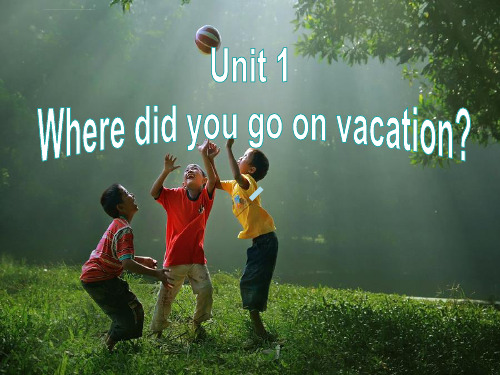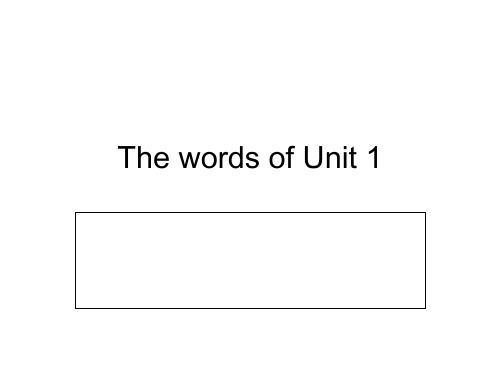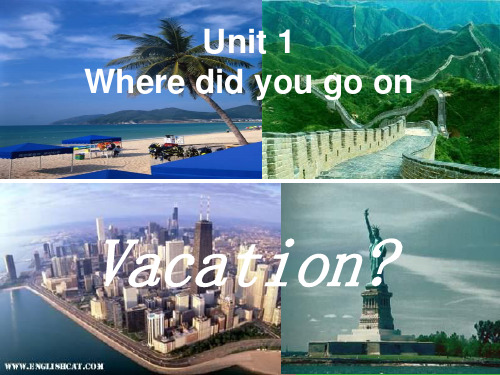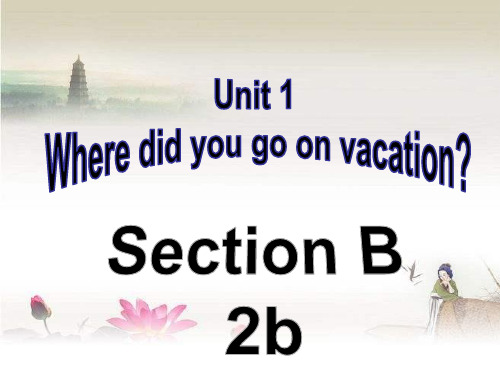人教版新目标英语八年级上册unit1课件.ppt幻灯片课件
合集下载
人教新目标版八年级英语上册第1单元第1课时课件 (共25张PPT)

Unit 1 Where did you go on vacation?
Section A 1a—2d
Language Aims
1. New words or phrases: anyone, anywhere, wonderful, few, quite a few, most 2. 不定代词或不定副词用法: I bought something for my parents. Did you do anything special last month? 3. Language structures: A: Where did you go on vacation? B: I went to the mountains. A: Did you go with anyone? B: Yes, I did. /No, I didn’t.
New words and phrases anyone 1. 任何人 ___________ anywhere 2. 任何地方___________ wonderful 3. 精彩的 ___________ few 4. 几乎没有___________ quite a few 5. 相当多 ___________ most 6. 大多数 ___________
一般过去时:定义、时间状语和过去式 1. 定义:表示过去某个时间或某一段时间内发生的动 作或存在的状态,常和过去时间状语连用。 2. 过去时间状语:yesterday, last week, two days ago,
in 1998等。 3. 动词过去式构成规则:
(1)“直接 + -ed ”:wanted played
(2)“只加 + -d ”: lived
used
Section A 1a—2d
Language Aims
1. New words or phrases: anyone, anywhere, wonderful, few, quite a few, most 2. 不定代词或不定副词用法: I bought something for my parents. Did you do anything special last month? 3. Language structures: A: Where did you go on vacation? B: I went to the mountains. A: Did you go with anyone? B: Yes, I did. /No, I didn’t.
New words and phrases anyone 1. 任何人 ___________ anywhere 2. 任何地方___________ wonderful 3. 精彩的 ___________ few 4. 几乎没有___________ quite a few 5. 相当多 ___________ most 6. 大多数 ___________
一般过去时:定义、时间状语和过去式 1. 定义:表示过去某个时间或某一段时间内发生的动 作或存在的状态,常和过去时间状语连用。 2. 过去时间状语:yesterday, last week, two days ago,
in 1998等。 3. 动词过去式构成规则:
(1)“直接 + -ed ”:wanted played
(2)“只加 + -d ”: lived
used
人教版新目标八年级英语上册Unit1第一课时ppt课件

常见心律失常心电图诊断的误区诺如 病毒感 染的防 控知识 介绍责 任那些 事浅谈 用人单 位承担 的社会 保险法 律责任 和案例 分析现 代农业 示范工 程设施 红地球 葡萄栽 培培训 材料
复合不定代词:
some any every
no
人 someone anyone everyone no one
Make your own
conversations.
How was your vacation?
Great!
Where did you go?
I went to the mountains.
常见心律失常心电图诊断的误区诺如 病毒感 染的防 控知识 介绍责 任那些 事浅谈 用人单 位承担 的社会 保险法 律责任 和案例 分析现 代农业 示范工 程设施 红地球 葡萄栽 培培训 材料
I went to Beijing
for vacation.
I went to summer
camp.
I went to the mountains.
I stayed at home. I went to the beach. I visited the museums.
常见心律失常心电图诊断的误区诺如 病毒感 染的防 控知识 介绍责 任那些 事浅谈 用人单 位承担 的社会 保险法 律责任 和案例 分析现 代农业 示范工 程设施 红地球 葡萄栽 培培训 材料
mountains _c_
6. went to the beach _a_
7. visited museums _e__
常见心律失常心电图诊断的误区诺如 病毒感 染的防 控知识 介绍责 任那些 事浅谈 用人单 位承担 的社会 保险法 律责任 和案例 分析现 代农业 示范工 程设施 红地球 葡萄栽 培培训 材料
新目标英语八年级上Unit 1 课件Unit1 单词(共20张PPT)

• try [traɪ] v.尝试;设法;努力 • try to do sth. 尽力做某事 • eg. Please try to finish this work in ten minutes. • 请尽量在10分钟内完成这项工作。 • try doing sth. 尝试做某事 • eg.Why don't you try riding a bike to go to school? • 为什么不尝试骑自行车去学校呢?
• eg. Quite a few students go to school by bike. • 相当多学生骑自行车上学。 • quite a little 意为“相当多”,修饰不可数名词,相当
于 much。 • eg. He drank quite a little water. • 他喝了相当多的水。
• below [bɪ'ləʊ] prep.低于;在...下面adv.在下面 • under (正)下方 • There is a lake below the mountain. • 山下有一个湖。 • There is a cat under the table. • 桌子底下有一只猫
• enough [ɪ'nʌf] adj.足够的adv.足够地;充分地 • 1.既可以放在名词前也可以放在名词后 • eg. I don't have enough money to buy this skirt.
句是真正的主语。 • eg.It seems that no one knows what
happened in the park. • 似乎没有人知道公园发生了什么事。
• someone ['sʌmwʌn] pron.某人;有人
• eg. Quite a few students go to school by bike. • 相当多学生骑自行车上学。 • quite a little 意为“相当多”,修饰不可数名词,相当
于 much。 • eg. He drank quite a little water. • 他喝了相当多的水。
• below [bɪ'ləʊ] prep.低于;在...下面adv.在下面 • under (正)下方 • There is a lake below the mountain. • 山下有一个湖。 • There is a cat under the table. • 桌子底下有一只猫
• enough [ɪ'nʌf] adj.足够的adv.足够地;充分地 • 1.既可以放在名词前也可以放在名词后 • eg. I don't have enough money to buy this skirt.
句是真正的主语。 • eg.It seems that no one knows what
happened in the park. • 似乎没有人知道公园发生了什么事。
• someone ['sʌmwʌn] pron.某人;有人
人教新目标八年级上Unit1课件(共25张PPT)

3a
Fill in the blanks with the words in the box and practice the conversation.
anything
anyone
everything
something anything anything
nothing
3b
everything
no one
vacation.
Yes, I bought _s_o_m__e_t_h_i_n_g__ (某物)
for my father.
__H__o_w__w__a_s_t_h_e__f_o_o_d_?____________
(食物怎么样呢?)
_E__v_e_r_y_t_h_in__g_t_a_s_t_e_d__re_a__ll_y_g__o_o_d_.__
(每样东西品尝起来都很好。)
_D__id__e_v_e_r_y_o_n__e_h_a__v_e_a__g_o_o_d__t_im__e_?_
( 每个人都玩得高兴吗?)
_O__h_,_y_e_s_._E__v_e_r_y_o_n_e__w_a__s_e_x_c_e_l_le_n__t.
(哦,是的。每样东西都很棒。)
Unit 1 Where did you go on
Vacation?
Teaching aims: 1.Master the new words and phrases. 2.Learn how to talk about the past events.
Where did you go on vacation?
Helen: Yes, I went to Guizhou with my
人教版新目标八年级Unit-1-Section-B-2b详解-PPT

What a difference a day makes! My father and I decided to go to Penang Hill today. We wanted to walk up to the top, but then it started raining a little so we decided to take the train. We waited over an hour for the train because there were too many people. When we got to the top, it was raining really hard. We didn’t have an umbrella so we were wet and cold. It was terrible! And because of the bad weather, we couldn’t see anything below. My father didn’t bring enough money, so we only had one bowl of rice and some fish. The food tasted great because I was so hungry!
lunch. (A )2. The boy felt like his leg was broken.
2. And because of the bad weather, we couldn’t see anything below. because of意为“因为”,后跟名词。 e.g. They didn’t go fishing because of the bad weather. 因为天气不好所以他们没有去钓 鱼。
lunch. (A )2. The boy felt like his leg was broken.
2. And because of the bad weather, we couldn’t see anything below. because of意为“因为”,后跟名词。 e.g. They didn’t go fishing because of the bad weather. 因为天气不好所以他们没有去钓 鱼。
人教版新目标八年级英语上册Unit1 Section A课件

中。 • any one 指某些人或事物中的任何一个, • 常与of 短语连用。作主语,谓语动词用单数。
• Any one of the books is interesting. • 这些书中任何一本都有趣。
Rick: Hi,Helen. Long time no see.
Helen: Hi,Rick. Yes, I was on vacation last month.
5 不定代词+形容词 something interesting
巩固练习:用不定代词或不定副词填空
1. I can’t hear anything = I can hear __n_o_t_h_in_g__.
2. There is _s_o_m_e_t_h_in_g__ on the floor. Please pick
stop
再加-ed
trip
stopped tripped
以“辅音字母+y”的动词,先 study
变“y”为“ i”再加-ed
worry
studied worried
am(is) →was
are →were
肯定句:主语 + was/were + 其他
He was at home yesterday.
我要拜访奶奶
visiபைடு நூலகம் 动词1拜访,看望, 后接表示人的名词或代词。 2参观,游览,后接表示地点的名词。 visit名词意为 “访问,参观,拜访"
my first visit to China
第一次到中国参观
visitor 参观者,游客
1. Tina 2. Xiang Hua
1b Listening 3.Sally 4. Bob 5. Tom
• Any one of the books is interesting. • 这些书中任何一本都有趣。
Rick: Hi,Helen. Long time no see.
Helen: Hi,Rick. Yes, I was on vacation last month.
5 不定代词+形容词 something interesting
巩固练习:用不定代词或不定副词填空
1. I can’t hear anything = I can hear __n_o_t_h_in_g__.
2. There is _s_o_m_e_t_h_in_g__ on the floor. Please pick
stop
再加-ed
trip
stopped tripped
以“辅音字母+y”的动词,先 study
变“y”为“ i”再加-ed
worry
studied worried
am(is) →was
are →were
肯定句:主语 + was/were + 其他
He was at home yesterday.
我要拜访奶奶
visiபைடு நூலகம் 动词1拜访,看望, 后接表示人的名词或代词。 2参观,游览,后接表示地点的名词。 visit名词意为 “访问,参观,拜访"
my first visit to China
第一次到中国参观
visitor 参观者,游客
1. Tina 2. Xiang Hua
1b Listening 3.Sally 4. Bob 5. Tom
新目标八年级上Unit1 Section A-2课件(共20张PPT)(优质课件)
课件在线
9
Grace
Julie
Grace: Where did you go on vacation?
Julie: I went to Huangshan.
Grace: Oh, really? Did you go with anyone?
Julie: Yes, I went with my friends. We were
go with anyone?
Grace go to Central Park?
buy anything
special?
课件在线
6
Did you…
Yes, I No, I didn’t. did.
play volleyball?
Kevin swim?
meet anyone interesting?
Grace Kevin Julie
课件在线
New York City the beach stayed at home
5
2b Listen again. Check ( ) Yes, I did or No, I didn’t for each question.
Did you…
Yes, I No, I didn’t. did.
课件在线
8
2c Pairwork
Role-play conversations between Grace, Kevin and Julie.
A: Grace, where did you go on vacation? B: I went to New York City. A: Oh, really? Did you go with anyone? B: Yes, I went with my mother.
人教新目标八年级英语上册课件Unit 1
How was the World Cup ?(世 界杯足球赛)
It was exciting.
1a Match the words with the pictures below.
1. f delicious
2. a expensive 3. c exciting
4. e cheap 5. b terrible 6. d boring
How was…?
How was her vacation? the fun park? the food
How were…?
How were the people? the stores
Let’s retell(复述) Lisa’s trip
Her vacation/great Hong Kong/her family a fun park/exciting--went shopping--the stores/expensive --buy something for her best friend--People/friendly--My parents’ friends/dinner--The food/delicious--Everyone/had a good time--Everything/excellent---
Unit 1
Where did you go on vacation?
Where did you go on vacation?
went to the beach went to the museum went to the Great Wall
went to New York City went to the mountains
2. Did she do anything special there? What was it?
人教版新目标英语八年级上册UNIT1精品课件
Class is over!
chocolate
milk
junk food
coffee
cola
chip
vegetable
fruit
1、But my mother wants me to drink it.
want to do sth. 想要做某事 want sb. to do sth. 想要某人干某事 Do you want to go to the movies with me? 你想和我一起去看电影吗? I want you to help me with my math. 我想要你帮我学数学。
11、次、次数 12、多久一次 13、至于、关于 14、踩滑板、参加滑板运动 15、没有的、全无的 16、几乎不、几乎没有 17、中学、公立中等学校 18、大多数的、大部分的 19、一次
time how often as for skateboard no hardly high school most once
3、sometimes
sometimes是频度副词,意为有时。和它一样是频度 副词的词还有哪些? CF:sometimes , some times , sometime , some time Sometimes:表示动作发生的不经常性,多用于现在或 过去的时态。 Sometimes:表示过去或将来的某个时间,是时间点, 对它进行提问要用when。 Some time:是名词短语,表示一段时间,是时间段。 Some times:意为几次,几倍。 对它提问用how many times.
3、散步是很好的运动。 (翻译)
1、喝,饮 2、习惯 3、必须 4、照顾,照看 5、采访者 6、虽然,即使,纵然 7、不同的,有区别的 8、或许,大概 9、分数,成绩 10、不健康的
初中英语人教版八年级上册Unit 1 .-阅读课件
现方式做保护处理对用户上传分享的文档内容本身不做任何修改或编辑并不能对任何下载内容负责
人教版新目标英语八上
Unit 1 How often do you exercise?
阅读课件
作者:XXXX
The good habits of English study
Jane is a 16-year-old high school student in the United States. American Teenager magazine asked her about her habits. Jane has a lot of good habits. She always exercises and she reads day Also, she _______ books every _______. often drinks juice ever and she hardly _______ stays up late. However, she has usually watches TV some bad habits, too. She _______ for more than two hours a day, and she _______ sometimes eats hamburgers. Her parents are not very hardly ever happy because she __________ helps with housework and she never _______ goes to the dentist 水 for teeth cleaning. She says she is afraid.
水
Free talk: Talk about your habits.
人教版新目标英语八上
Unit 1 How often do you exercise?
阅读课件
作者:XXXX
The good habits of English study
Jane is a 16-year-old high school student in the United States. American Teenager magazine asked her about her habits. Jane has a lot of good habits. She always exercises and she reads day Also, she _______ books every _______. often drinks juice ever and she hardly _______ stays up late. However, she has usually watches TV some bad habits, too. She _______ for more than two hours a day, and she _______ sometimes eats hamburgers. Her parents are not very hardly ever happy because she __________ helps with housework and she never _______ goes to the dentist 水 for teeth cleaning. She says she is afraid.
水
Free talk: Talk about your habits.
- 1、下载文档前请自行甄别文档内容的完整性,平台不提供额外的编辑、内容补充、找答案等附加服务。
- 2、"仅部分预览"的文档,不可在线预览部分如存在完整性等问题,可反馈申请退款(可完整预览的文档不适用该条件!)。
- 3、如文档侵犯您的权益,请联系客服反馈,我们会尽快为您处理(人工客服工作时间:9:00-18:30)。
every day /once a week /twice a month
school!
Reporter:How often do you go to the
movies?
Cheng :Uhh ... let’s see ... maybe
once a month?
Reporter:How often do you exercise? Cheng :Oh,I exercise about three
几乎不
a boy
fat; doesn’t like
never
E
exercise at all.
从不
1b listening
Listen and fill in the blanks:
always(100%) go shopping
usually
exercise
often
go skateboarding
I can’t stand shopping.
Girl 2 : I often go skateboarding.
Boy 2 : And I sometimes watch TV.
Reporter: How about you?
Girl
3: I hardly ever watch TV. I
love
reading.
Reporter: Oh, why is that?
Girl
3: Oh, I don't know. I guess
I just like books.
1c
The question:
What do you usually do on weekends ?
The answers:
times a week.
Reporter:How often do you shop? Cheng :Shop? I shop about ... about
twice a month.
2c
The question:
How often do you watch TV?
The answers:
① I always do my homework on weekends. ② I usually / often watch TV. ③ I sometimes listen to music. ④ I hardly ever play computer games. ⑤ I never play soccer.
sometimes watch TV
hardly ever watch TV
never(0%) go shopping
Tapescript
Reporter: What do you usually do on
weekends?
Boy 1: I usually exercise. Girl 1: I always go shopping. Boy 2: Eeeeew…I never go shopping.
2a
Listen to the tape. How often does Cheng do different things. Number the activities you hear[1-5]
a, 3
Go to the movies
b, 1
watch TV
C, 5
shop
d, 4
exercise
1b
a boy
like exercise very much
always 总是 A
also a boy like exercise.
Usually / B
often 通常
a girl
doesn’t mind exercise . Sometimes C
有时
also a girl doesn’t like exercise. hardly ever D
人教版新目标英语八年级上册 unit1课件.ppt
Section A
Period 1 (1a-2c)
1a Look at the picture.
What do they usually do on weekends ?
a, shopping b, reading C, exercising d, watching TV e, skateboarding
e, 2
read
2b
Activities
a. go to the movies b. watch TV c. shop d. exercise e. read
How often
every day once a week twice a week three times a week once a month twice a mouth
Tapescript
Reporter: So, Cheng, how often do
you watch TV?
Cheng : Hmmmm…about twice a
week, I guess.
Reporter: Uh-huh…And how often do
you read.
Cheng :Oh, I read every day at
Twice a week.
Period 2(3-4)
Grammar Focus
What do you usually do on weekends ?
How often do you watch TV?
always /usually /often /sometimes /hardly ever /never
•What do you usually do on weekends ?
Do you often do sports ? Do you often do your homework ? Do you often watch TV ? Do you often play computer games ?
2a
• once • twice • three times • four times
一次 两次 三次 四次
数字+times
一两次 once or twice 两三次 two or three times
2a
• 一周一次 • 一年ce a year twice a day once two weeks
school!
Reporter:How often do you go to the
movies?
Cheng :Uhh ... let’s see ... maybe
once a month?
Reporter:How often do you exercise? Cheng :Oh,I exercise about three
几乎不
a boy
fat; doesn’t like
never
E
exercise at all.
从不
1b listening
Listen and fill in the blanks:
always(100%) go shopping
usually
exercise
often
go skateboarding
I can’t stand shopping.
Girl 2 : I often go skateboarding.
Boy 2 : And I sometimes watch TV.
Reporter: How about you?
Girl
3: I hardly ever watch TV. I
love
reading.
Reporter: Oh, why is that?
Girl
3: Oh, I don't know. I guess
I just like books.
1c
The question:
What do you usually do on weekends ?
The answers:
times a week.
Reporter:How often do you shop? Cheng :Shop? I shop about ... about
twice a month.
2c
The question:
How often do you watch TV?
The answers:
① I always do my homework on weekends. ② I usually / often watch TV. ③ I sometimes listen to music. ④ I hardly ever play computer games. ⑤ I never play soccer.
sometimes watch TV
hardly ever watch TV
never(0%) go shopping
Tapescript
Reporter: What do you usually do on
weekends?
Boy 1: I usually exercise. Girl 1: I always go shopping. Boy 2: Eeeeew…I never go shopping.
2a
Listen to the tape. How often does Cheng do different things. Number the activities you hear[1-5]
a, 3
Go to the movies
b, 1
watch TV
C, 5
shop
d, 4
exercise
1b
a boy
like exercise very much
always 总是 A
also a boy like exercise.
Usually / B
often 通常
a girl
doesn’t mind exercise . Sometimes C
有时
also a girl doesn’t like exercise. hardly ever D
人教版新目标英语八年级上册 unit1课件.ppt
Section A
Period 1 (1a-2c)
1a Look at the picture.
What do they usually do on weekends ?
a, shopping b, reading C, exercising d, watching TV e, skateboarding
e, 2
read
2b
Activities
a. go to the movies b. watch TV c. shop d. exercise e. read
How often
every day once a week twice a week three times a week once a month twice a mouth
Tapescript
Reporter: So, Cheng, how often do
you watch TV?
Cheng : Hmmmm…about twice a
week, I guess.
Reporter: Uh-huh…And how often do
you read.
Cheng :Oh, I read every day at
Twice a week.
Period 2(3-4)
Grammar Focus
What do you usually do on weekends ?
How often do you watch TV?
always /usually /often /sometimes /hardly ever /never
•What do you usually do on weekends ?
Do you often do sports ? Do you often do your homework ? Do you often watch TV ? Do you often play computer games ?
2a
• once • twice • three times • four times
一次 两次 三次 四次
数字+times
一两次 once or twice 两三次 two or three times
2a
• 一周一次 • 一年ce a year twice a day once two weeks
